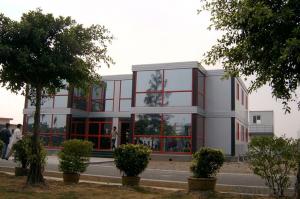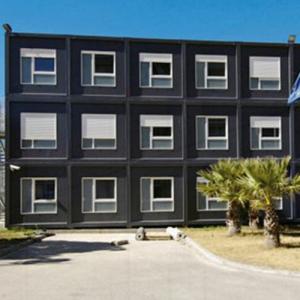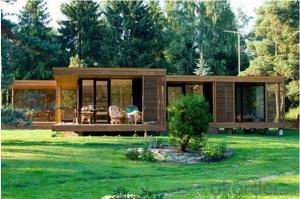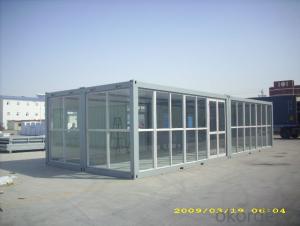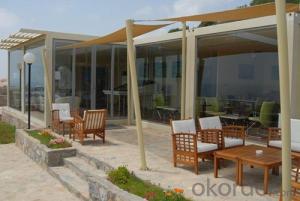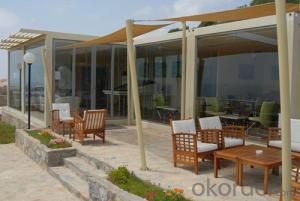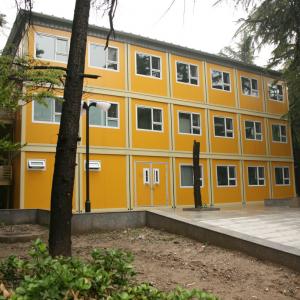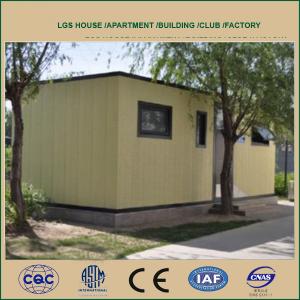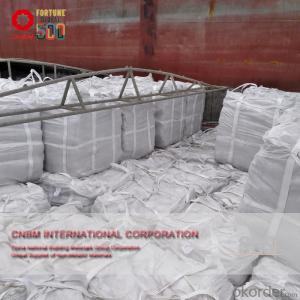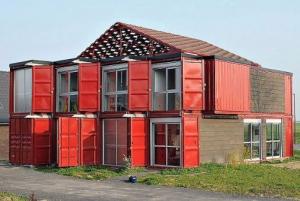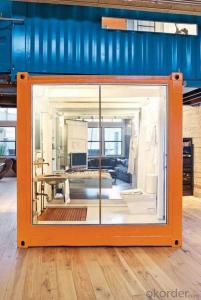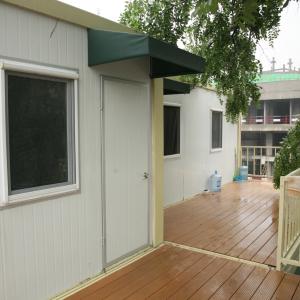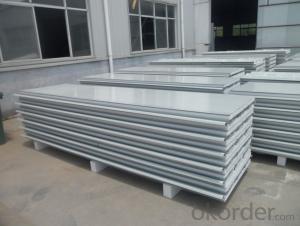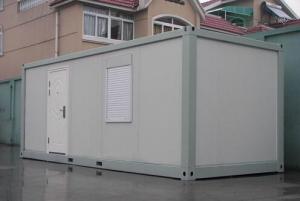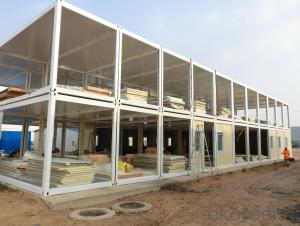Quick Installed Prefabricated Container House of Office Building
- Loading Port:
- Tianjin
- Payment Terms:
- TT OR LC
- Min Order Qty:
- -
- Supply Capability:
- 20000 Set set/month
OKorder Service Pledge
OKorder Financial Service
You Might Also Like
Quick Installed Prefabricated Container House of Office Building
Sandwich panel and Quick Installed Prefabricated Container Mobile House
1.Cheap Price but High Quality Two Storey Prefabricated Container Mobile House
2.Affordable Prefabricated Container Mobile House
1.Advantages of flatpack container house Features:
Efficient transportation
Fast construction
Flexible combination
Cost saving
Green & Sustainability
Quick Installed Prefabricated Container House of Office Building
Sandwich panel and Quick Installed Prefabricated Container Mobile House
Cheap Price but High Quality Two Storey Prefabricated Container Mobile House
Affordable Prefabricated Container Mobile House
2. General information:
| Item | Description |
| Name | prefab shipping container homes |
| Structure |
|
| Wall Panel |
|
| Insulation |
|
| Electrical |
|
| Door |
|
| Window |
|
| | |
- Q:Can container houses be designed with solar panels?
- Yes, container houses can definitely be designed with solar panels. In fact, container houses are particularly well-suited for solar panel installations due to their modular and portable nature. The large, flat roofs of containers provide ample space for the installation of solar panels, allowing homeowners to harness the power of the sun and generate clean and renewable energy. Additionally, containers can be easily modified and customized to accommodate the wiring and infrastructure required for solar panel systems. The use of solar panels in container houses not only helps reduce dependence on traditional energy sources but also promotes sustainability and environmental friendliness.
- Q:Are container houses suitable for co-working or shared office spaces?
- Depending on the specific needs and requirements of individuals or businesses, container houses can serve as a suitable choice for co-working or shared office spaces. These houses possess a range of advantages that make them appealing for such purposes. To begin with, container houses offer a relatively affordable and cost-effective alternative to traditional office spaces. They can be easily converted into functional workspaces at a fraction of the cost required to construct a new building. This affordability is especially advantageous for startups, freelancers, or small businesses operating with limited budgets. Moreover, container houses are highly customizable and flexible. They can be modified and designed to meet the specific needs of a co-working or shared office space. Containers can be stacked, arranged in various layouts, or combined to create larger work areas. This flexibility allows for efficient space utilization and can easily accommodate different work styles and preferences. Furthermore, container houses possess the benefit of portability, making them well-suited for businesses requiring flexibility or anticipating relocation in the future. This mobility enables businesses to adapt to changing needs and markets, providing a convenient solution for those that may need to shift operations or expand into new areas. Additionally, container houses are eco-friendly and sustainable. They are constructed using recycled materials, reducing waste and contributing to a more environmentally conscious approach. Moreover, container houses can be equipped with energy-efficient systems, such as solar panels or rainwater harvesting, further reducing their environmental impact. However, before considering container houses for co-working or shared office spaces, it is essential to consider certain factors. Privacy, noise insulation, and adequate ventilation are crucial aspects that must be addressed to ensure a comfortable and productive work environment. Implementing proper insulation and soundproofing measures is vital in minimizing distractions and creating a conducive workspace. In conclusion, container houses can serve as a viable option for co-working or shared office spaces due to their affordability, flexibility, portability, and sustainability. Nonetheless, careful planning and addressing specific requirements are necessary to ensure a comfortable and functional workspace for all occupants.
- Q:Are container houses suitable for individuals who enjoy gardening?
- Yes, container houses are definitely suitable for individuals who enjoy gardening. In fact, container houses can offer unique advantages for garden enthusiasts. One of the key benefits is the ability to create a rooftop or balcony garden, even in urban areas where space is limited. Containers can be easily placed on the roof or balcony, allowing for the cultivation of a wide variety of plants, flowers, and even vegetables. Container houses also provide the opportunity for vertical gardening. By using trellises, hanging baskets, or wall-mounted planters, gardeners can maximize the use of their vertical space and create a lush and vibrant garden. This is especially beneficial for those who have limited ground space but still want to enjoy the beauty and benefits of gardening. Moreover, container houses provide a controlled environment for gardening. The containers can be easily insulated, providing better temperature control and protection from extreme weather conditions. This enables individuals to grow plants that may not be suitable for their region's climate, or to extend the growing season for certain crops. Additionally, container houses typically have good natural lighting due to large windows or skylights, which allows plants to thrive. Furthermore, container houses are often designed with sustainability in mind. Many containers are repurposed from shipping containers, which helps reduce waste and promote recycling. Additionally, container houses can incorporate sustainable features such as rainwater harvesting systems or composting toilets, further enhancing the eco-friendly aspect of gardening. In summary, container houses are a great option for individuals who enjoy gardening. They offer unique opportunities for rooftop or balcony gardens, vertical gardening, and a controlled environment for growing a wide variety of plants. With their sustainability features and ability to utilize limited space effectively, container houses provide an excellent platform for garden enthusiasts to indulge in their passion for gardening.
- Q:Are container houses legal in all areas?
- No, container houses are not legal in all areas. The legality of container houses varies from one jurisdiction to another, as local building codes and zoning regulations determine whether these types of structures are permitted. It is essential to check with local authorities and obtain necessary permits before constructing or residing in a container house.
- Q:Are container houses suitable for community centers or gathering spaces?
- Indeed, community centers or gathering spaces can benefit greatly from the use of container houses. The popularity of container houses has soared in recent years, primarily due to their affordability, sustainability, and versatility. These qualities make them an excellent choice for community centers or gathering spaces. Affordability is one of the key advantages of container houses. Constructing a community center or gathering space can be an expensive undertaking, particularly when traditional construction methods are employed. However, utilizing repurposed shipping containers significantly reduces construction costs, making it a more viable option for community organizations or local governments with limited budgets. Moreover, container houses are highly sustainable. By repurposing shipping containers, we decrease the demand for new construction materials, thereby minimizing the environmental impact. Additionally, container houses can be easily modified and relocated, providing flexibility for community centers. If the needs of the community change, the container house can be adapted or moved to a different location, ensuring its long-term usefulness. Container houses also offer a wide range of design possibilities. With a touch of creativity, shipping containers can be transformed into appealing and functional spaces. They can be customized to include various amenities such as meeting rooms, classrooms, kitchens, or recreational areas. The modular nature of container houses allows for easy expansion or downsizing, depending on the community's requirements. Finally, container houses have the potential to foster a sense of community. Their unique and unconventional design can serve as a point of interest and conversation, encouraging community members to engage and connect with one another. By providing a space for diverse activities and events, container houses can promote social cohesion and strengthen community bonds. In conclusion, container houses are indeed well-suited for community centers or gathering spaces. Their affordability, sustainability, versatility, and ability to build community make them an appealing choice for organizations or governments seeking to create vibrant and inclusive spaces for their communities.
- Q:What are the building regulations for container houses?
- The regulations for container houses differ depending on the country, state, and local jurisdiction. However, there are some general guidelines and considerations that typically apply when constructing a container house. To begin with, it is essential to inquire with the local planning department or building control authority to determine if container houses are allowed in the area. Some regions may have restrictions or zoning regulations that restrict or prohibit the use of shipping containers for residential purposes. Regarding structural requirements, container houses must meet certain standards to ensure stability and durability. This may involve reinforcing the container structure, adding extra support columns, or welding components together to create a more stable structure. The specific regulations for structural modifications will depend on the local building codes and engineering requirements. Insulation and ventilation are also crucial aspects. Containers are made of steel, which presents challenges in terms of temperature regulation. Sufficient insulation and ventilation systems must be installed to ensure the comfort and safety of the occupants. This may entail adding insulation materials to the walls, floors, and ceilings, as well as installing ventilation fans or windows for airflow. Electrical and plumbing systems must also adhere to local building codes and safety regulations. This includes correctly installing electrical wiring, outlets, and switches, as well as plumbing fixtures and connections. It is advisable to hire licensed professionals for these installations to ensure compliance with the regulations and guarantee the safety of the occupants. Additionally, container houses may need to satisfy requirements related to fire safety, accessibility, and energy efficiency. This can involve installing fire-resistant materials, providing accessible entrances and exits, and incorporating energy-efficient features such as solar panels or energy-saving appliances. In conclusion, it is crucial to research and consult with local authorities and professionals to understand the specific building regulations for container houses in your area. By adhering to these regulations, you can ensure that your container house is safe, compliant, and suitable for long-term occupancy.
- Q:Can container houses be designed to have a skylight?
- Yes, container houses can definitely be designed to have a skylight. Skylights are a popular feature in many modern homes, and container houses are no exception. With the right planning and design, it is possible to incorporate a skylight into a container house. One approach to adding a skylight to a container house is by using a modified container that already has a roof opening or space for a skylight. This can be achieved by removing a section of the container's roof and replacing it with a skylight or by using a specially designed container with a prefabricated skylight. Another option is to create a custom design where a skylight is added to the container house during the construction process. This may involve cutting an opening in the roof of the container and installing a skylight system that allows natural light to enter the interior space. There are various types of skylights available, such as fixed skylights, vented skylights, and tubular skylights. The choice of skylight will depend on factors such as the size and layout of the container house, the desired amount of natural light, and the overall design aesthetic. Adding a skylight to a container house can bring several benefits. It allows for increased natural light, which can create a more open and spacious feel inside the house. Additionally, skylights can provide passive solar heating during the day, reducing the need for artificial lighting and potentially lowering energy costs. However, it is important to consider the structural integrity and insulation of the container house when adding a skylight. Proper sealing and insulation around the skylight are crucial to prevent leaks, heat loss, or excessive heat gain. In conclusion, container houses can be designed to have a skylight. With careful planning and construction, a skylight can be incorporated into the container house design, providing natural light, energy efficiency, and a unique architectural feature.
- Q:Can container houses be designed with green roofs?
- Yes, container houses can be designed with green roofs. Green roofs, also known as living roofs or eco-roofs, are designed to have vegetation planted on top of the building structure. These roofs provide numerous environmental benefits, including insulation, stormwater management, and improved air quality. Container houses, made from repurposed shipping containers, can accommodate green roofs just like any other traditional building. However, there are some considerations to take into account when designing green roofs for container houses. First, the structural integrity of the container house needs to be assessed to ensure it can support the additional weight of a green roof. Green roofs can be quite heavy, especially when soil, plants, and water are added. Reinforcements may be required to ensure the container can withstand the load. Second, proper waterproofing and drainage systems are essential to prevent water leakage into the container structure. Green roofs retain water, so it is crucial to have a well-designed system to manage excess water and avoid damage to the container. Third, container houses may have limited space available for a green roof, depending on the size and configuration of the containers. Designers and architects need to carefully plan and optimize the available space to create a functional and aesthetically pleasing green roof. Lastly, the selection of plants for the green roof should be chosen carefully, considering the local climate and the weight limitations of the container structure. Drought-resistant and lightweight plants are often preferred for container house green roofs. With proper planning, design, and implementation, container houses can indeed incorporate green roofs. This combination can contribute to sustainable living by maximizing energy efficiency, reducing environmental impact, and creating a harmonious connection with nature.
- Q:Are container houses prone to pests or insects?
- Container houses are not inherently more prone to pests or insects compared to traditional houses. However, like any other type of dwelling, container houses may attract pests if proper measures are not taken. Regular maintenance, sealing any openings, and implementing effective pest control strategies can help prevent infestations in container houses, just as it would in any other home.
- Q:Can container houses be built with a home workshop or hobby space?
- Absolutely! Home workshops or hobby spaces can definitely be built using container houses. The great thing about container houses is their modular design, which allows for high levels of customization and adaptability to different purposes. This means you can easily create dedicated spaces for hobbies and workshops. Whether you're into woodworking, painting, or crafting, containers can be transformed into functional and comfortable spaces for pursuing your interests. One of the benefits of using containers for workshop or hobby spaces is their structural strength. Containers are specifically built to withstand extreme weather conditions, making them perfect for housing heavy equipment and tools. Moreover, containers can be stacked or arranged in various configurations, allowing for efficient use of space and the creation of multi-level areas. To convert a container into a workshop or hobby space, certain modifications may be required. These can include installing windows to bring in natural light, adding insulation for temperature control, wiring for lighting and power outlets, and setting up ventilation systems to ensure proper air circulation. It's also important to consider the specific needs of your hobby or workshop and incorporate storage solutions, workbenches, and other necessary equipment to create a functional and organized space. Additionally, container houses offer the advantage of mobility. If you have a workshop or hobby space in a container, you can easily transport it to a different location if needed. This makes container houses ideal for individuals who may need to relocate or for those who prefer a flexible living arrangement. In summary, container houses are indeed suitable for building home workshops or hobby spaces. The versatility and durability of containers allow for the creation of customized and functional spaces that cater to various hobbies and workshops. With proper planning and modifications, container houses can provide a comfortable and convenient environment for pursuing your passions.
1. Manufacturer Overview |
|
|---|---|
| Location | |
| Year Established | |
| Annual Output Value | |
| Main Markets | |
| Company Certifications | |
2. Manufacturer Certificates |
|
|---|---|
| a) Certification Name | |
| Range | |
| Reference | |
| Validity Period | |
3. Manufacturer Capability |
|
|---|---|
| a)Trade Capacity | |
| Nearest Port | |
| Export Percentage | |
| No.of Employees in Trade Department | |
| Language Spoken: | |
| b)Factory Information | |
| Factory Size: | |
| No. of Production Lines | |
| Contract Manufacturing | |
| Product Price Range | |
Send your message to us
Quick Installed Prefabricated Container House of Office Building
- Loading Port:
- Tianjin
- Payment Terms:
- TT OR LC
- Min Order Qty:
- -
- Supply Capability:
- 20000 Set set/month
OKorder Service Pledge
OKorder Financial Service
Similar products
New products
Hot products
Related keywords
